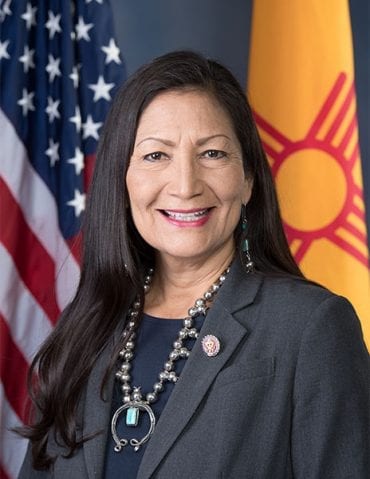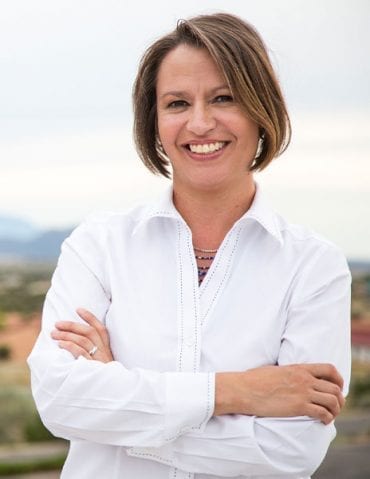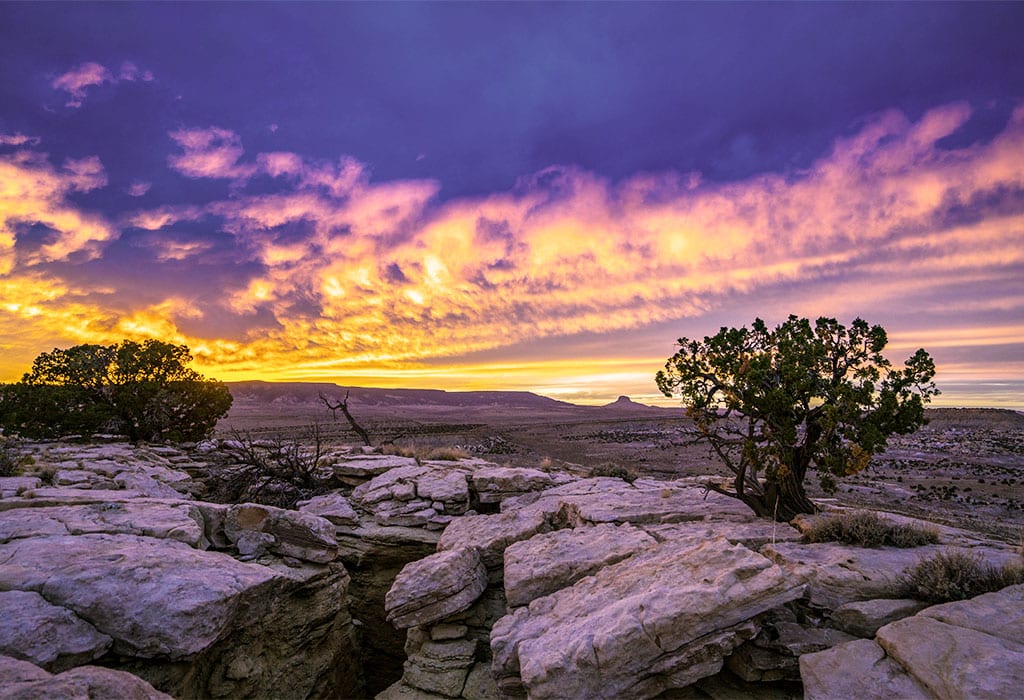There’s a picture of New Mexico Public Lands Commissioner Stephanie Garcia Richard in the Los Alamos Daily Post, accompanying an interview she did just days after taking office this January. In it, she stands smiling under 24 framed headshots of prior public lands commissioners. Look closely and you’ll spot one crucial difference between the people in the headshots and the woman posing beneath them: every single framed photograph is of a male.
Garcia Richard is New Mexico’s first female Public Lands Commissioner. She’s among the many movers and shakers New Mexicans propelled into office on the crest of 2018’s Blue Wave, along with Representative Deb Haaland (D–NM), one of the first Native American women elected to Congress. They are not the white male legislators of old. And that’s exactly what the West’s wildlife needs.
Unlike their predecessors, these women aren’t bound by the past. They aren’t infatuated with a “wild west” history that is fast fading. They don’t care which ranchers and trappers have historically had representatives’ ears (and votes). When they see cruelty—family dogs writhing in painful leghold traps, coyotes murdered en masse during killing contests—they confront it. They cast off the shackles of a shameful history and get to work.
It’s about time.
Representative Deb Haaland
Representative Deb Haaland is a member of the Laguna Pueblo and represents New Mexico’s 1st congressional district in the U.S. House of Representatives. Prior to her election, she chaired the Democratic Party of New Mexico.
Ask Haaland her thoughts on trapping and she does not equivocate, prevaricate, or hedge.
“It’s just the cruelest form of death that we can inflict on an animal,” she said. “It’s inhumane. I don’t think we should allow it on our public lands.”

Representative Deb Haaland.
When she was growing up, Haaland’s grandparents and father nurtured in her an enduring respect for the Wild— respect rooted in centuries of Pueblo stewardship of lands and wildlife.
They taught her to believe in a circle of life, that “we’re all part of the earth.” They taught her to respect the deer, antelope, and other animals Pueblos have subsisted on for centuries, and about the spirituality and sacrifice inherent in hunting them.
“You end the animal’s life as quickly as possible so it doesn’t suffer. You honor it by thanking its spirit for allowing us to live,” she explained.
It’s an approach wholly at odds with the ethic of dominion over wildlife that has characterized the West’s dominant cultures for so long. Which puts Haaland into direct confrontation with any and all powers that be who treat the earth with disrespect, from trappers to the fossil fuel industry.
Nevertheless, she remains undaunted. Because, at least when it comes to the House of Representatives, she knows she is far from alone in wanting to do better for our planet.
“We have an incredibly diverse Congress, more diverse than ever. With more women than ever. There are a lot of folks whose priorities center around our environment and climate change, and I believe that we’ve gotten some good people in office that will fight for wildlife,” she said.
Haaland isn’t just talking the talk here; she’s poised to walk the walk, as well. As chair of the Subcommittee on National Parks, Forests, and Public Lands, she has a front-row seat when considering public lands legislation, and she pledges to support anti-trapping legislation on public lands if it reaches the federal level.
In the meantime, she lives by this quote from Qwatsinas, Chief Edward Moody of the Nuxalk Nation in Canada: “We must protect the forest for our children, grandchildren, and children yet to be born. We must protect the forest for those who can’t speak for themselves, such as the birds, animals, fish and trees.”
“I like that,” she said. “Because it’s up to us to care. We’re the ones who have to change.”
Commissioner Stephanie Garcia Richard
Stephanie Garcia Richard served three terms in the New Mexico House of Representatives before winning the race for Public Lands Commissioner, beating out an opponent bankrolled by the oil and gas industry. She now holds what’s considered to be one of the most powerful elected offices in the state.
As commissioner, Garcia Richard is in charge of New Mexico’s state trust lands, which comprise nine million acres of surface lands and 13 million acres of mineral rights. In January, just days into her new position, she issued an executive order to ban coyote killing contests held on these lands.

Commissioner Stephanie Garcia Richard. Photo credit: Amy Mikler.
The ban was years in the making. Ending the abhorrent contests, which offer prizes to participants who kill the most coyotes, smallest coyote, most unusual coyote, and other revolting categories, was part of Garcia Richard’s campaign for commissioner—a platform that set her apart from other Democratic nominees (one nominee did not oppose the contests, while another voted against banning them). And as far back as 2013, her very first term in the New Mexico legislature, she threw her support behind a bill to end coyote killing contests.
But the seeds for Garcia Richard’s killing contest ban were truly planted decades before she became a legislator, during her upbringing in southwestern New Mexico. Born into a ranching family, she grew up on the doorstep of the nation’s oldest wilderness: the Gila.
“Having that wilderness out my back door really impacted my worldview on our responsibility to steward wildlife, lands, water, and robust ecosystems,” she said.
Ending coyote killing contests on state trust lands is only the beginning of Garcia Richard’s plan to protect wildlife in the Land of Enchantment. Early in 2019, she came out in support of HB 366, a bill to end trapping on public lands in New Mexico. When that bill failed to make its way through the legislature, she began pursuing a prohibition on leghold traps, snares, and poisons on state trust lands. She’s currently negotiating with the New Mexico Game and Fish Commission, which has an easement on the lands.
According to Garcia Richard, New Mexico has lately made great strides toward coexisting with its wildlife, culminating in Governor Michelle Lujan Grisham signing the bill to ban coyote killing contests on New Mexico’s public lands this past April (the same practice Garcia Richard targeted with her executive order, but applied to the 22 million acres of public lands in the state, rather than to state trust lands).
“The passage of the coyote killing ban and its signature from the governor really signifies a shift in how we approach wildlife in the state of New Mexico,” she said.
Garcia Richard noticed that shift happening years ago. When she was a legislator, it was on the minds of her constituents—one of whom approached her to sponsor a bill requesting that the New Mexico Department of Health and the New Mexico Game and Fish Commission treat wildlife that come into contact with people more humanely (alas, that bill died in the House).
“As human development encroaches on wildlife habitat, this is going to become more and more of an issue for us— how do we handle our interactions with wildlife?” Garcia Richard said. “It’s imperative we develop a new ethos towards wildlife management that’s based on sound wildlife management practices and sound science.”
Entrusted With Trust Lands
By leasing its state trust lands for oil and gas development, renewable energy use, agriculture, commercial use, and other purposes, the state of New Mexico funds its schools and hospitals. It’s Garcia Richard’s job to ensure these lands generate revenue and, at the same time, preserve them and their wildlife for future generations.
On paper, it sounds like a tightrope walk; to Garcia Richard, these two directives are not mutually exclusive—in fact, they must not be.
The constitutional mandate of New Mexico’s State Land Office stipulates that it must raise revenue in the “best interest” of its beneficiaries, she explained.
“To me, the ‘best interest’ is protecting our resources as we’re raising that revenue,” she said. “All the money in the world won’t matter if we’re being poisoned by our air, if we’re unable to drink our water, if we’re under constant threat of natural disasters because of climate change.”
So rather than maximizing state trust land profits via, for instance, mining uranium (an option that was on the table, but one she passed over due to the environmental degradation it causes), Garcia Richard is seeking out renewable energy and conservation opportunities on these lands. That way, the next generation of New Mexicans will have the chance to develop the same rapport with the Wild as she once did, putting them on a path to become its future stewards.
After all, to be entrusted with state trust lands is to be entrusted with far more than just securing a revenue stream. It’s to be entrusted with safeguarding the close relationship with the Wild that lives in the beating heart of every New Mexican.
Affirms Garcia Richard, “We love and care for our land, water, air, and wildlife. It’s a New Mexican identity.”
How We Win the West
For centuries, the desires of the ranching and agricultural lobbies have dictated the political will in the American West, and political and financial resources have been funneled into trapping, killing, snaring, poisoning, and otherwise eradicating its wildlife.
In recent decades, public sentiment has begun shifting toward coexistence: just look at Colorado, which banned trapping via ballot initiative nearly a quarter-century ago. Yet progress in state legislatures has been slower when it comes to confronting cruelty, and elected representatives have been unwilling to push back against the status quo of slaughter—until now.
Thanks to a new crop of lawmakers in Congress and state legislatures elected in 2018’s “Blue Wave”—including Representative Deb Haaland and Commissioner Stephanie Garcia Richard—it seems that good things are finally coming to the wildlife advocates and wild creatures who have waited so long for their due.
In New Mexico alone during the past seven months:
• Governor Michelle Lujan Grisham signed SB 76 into law, banning coyote killing contests in New Mexico (April).
• An anti-trapping bill, HB 366 (“Roxy’s Law”), made it farther in the legislature than similar bills ever have before (March).
• Commissioner Garcia Richard issued an executive order ending coyote killing contests on state trust lands (January).
It’s progress, certainly, but we still have a long way to go. That’s why Guardians continues to strive for a future in which animal and humane issues are cemented in the progressive agenda, taking their rightful place alongside climate resilience, healthcare, and education. Only then can we transform the narrative of the American West from a story of wildlife slaughtered and lands subdued to a tale of protection, respect, and reverence for the place we call home.
